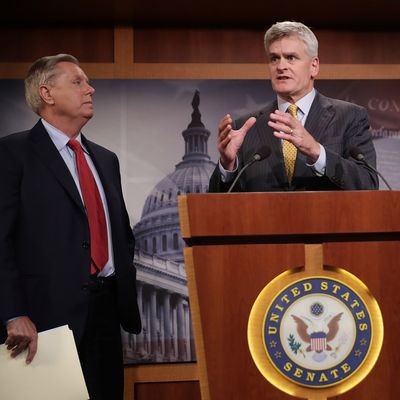
Believe it or not, Senate Republicans (with a strong push from the White House) are talking about yet another partisan health-care initiative. This last cookie on the plate is the Graham-Cassidy proposal that was bruited about (though not released or scored by the CBO, much less voted on) during the Senate debate that crashed and burned last week when “skinny repeal” failed to attract 50 votes. While the legislative details vary according to which version of the proposal you read, Graham-Cassidy would reportedly turn both Medicaid expansion and Obamacare-tax-credit money into a block grant for states, put a long-term per capita cap on Medicaid, and allow states significant control on whether to keep, modify, or discard key Obamacare insurance regulations.
Even though senior Republican senator Orrin Hatch has reached the conclusion that his colleagues are too divided to pass a partisan health-care bill, Graham-Cassidy offers a bit of a psychological lifeline. It has, after all, already been endorsed by key GOP “moderate” Dean Heller. It bears some resemblance to the earlier proposal that BCRA/“skinny repeal” holdout Susan Collins co-sponsored with Cassidy. John McCain, the actual slayer of “skinny repeal,” is famously Lindsey Graham’s amigo. And its two key features — state flexibility over services and regulations, combined with federal funding cuts — should in theory be attractive to conservatives.
There are some major uncertainties about Graham-Cassidy — including one, the possible inclusion of Cruz-amendment (letting insurers offer cheaper and skimpier health plans) language, that could make it more attractive to conservatives while violating its general principle of letting states call the key shots (Graham-Cassidy definitely repeals Obamacare’s individual and employer mandates, a real problem for insurers worried about young and healthy people exiting the insurance pools). And there’s a pretty good chance the whole thing could run afoul of budget rules and require 60 votes, which would defeat the whole purpose of using the budget process to enact health-care legislation.
Details and procedural hurdles aside, though, the basic idea — offering states more flexibility over use of radically reduced federal funds — is one the Republican Party has liked for decades.
But the marketing of Graham-Cassidy, though, has been dishonest: It does not, in any meaningful sense, let states “keep Obamacare if they want to,” as its sponsors frequently imply. All of the new money put into state treasuries by the Affordable Care Act would be phased out after ten years. And indeed, states would have to immediately start matching a percentage of the federal money that is provided. States that expanded Medicaid would lose some additional dollars right away since the baseline for this new block grant would apparently shift some resources to non-expansion states so as not to “discriminate” against them. And the automatic adjustment of both Medicaid and tax-credit dollars to the actual needs of people in individual states would be lost altogether.
The AHCA/BCRA Medicaid per capita cap would cut federal contributions to Medicaid, above and beyond the cuts in Medicaid made possible by Obamacare. There would be three-quarters-of-a-trillion dollars over ten years, with deeper cuts beyond that “window.” This would essentially end Medicaid as an individual entitlement program. So to a considerable extent, Graham-Cassidy would give states the flexibility to cut services for vulnerable populations.
The proposal would definitely end any real national scheme for health-care coverage of people who don’t qualify for some separate program like Medicare, CHIP, or the VA health system. That could create some particularly troublesome problems for insurers who have no idea how to structure or price individual insurance policies while awaiting state-level decisions on regulations, coverage, and financing.
As Vox’s Sarah Kliff observes:
This would be a marketplace where insurance companies have to accept all patients — but there is little incentive for those who are relatively healthy to purchase plans. There would be no requirement to purchase coverage, nor would there be a guarantee of subsidies to make that coverage affordable (although states could choose to spend their grant toward this purpose).
The main appeal of Graham-Cassidy is to Republicans who just want to pass off the health-care policy issue to the states, and perhaps to sitting Republican governors who will enjoy their new power over federal dollars without worrying about what happens when the dollars really begin to wither away. It’s unclear if that’s enough to attract senators like Collins, Murkowski, and McCain, without repelling conservatives like Cruz, Lee, and Paul. And again, the Senate parliamentarian could blow the whole thing up by adjudging the regulatory “flexibility” the proposal includes as requiring 60 votes.
It is also possible that some better-funded variation on this idea, perhaps closer to the original Cassidy-Collins proposal, will emerge, aimed at attracting just enough Democratic support to overcome a 60-vote threshold. At that point blue-state Democrats pleased with the idea of their own jurisdiction being able to continue something very close to Obamacare will have a moral quandary to address. Truly letting states govern health-care policy will most hurt poorer and sicker people in red states. Is throwing their interests to the wind acceptable to policy-makers who call themselves “progressive”?
There is one final factor to consider in any “let-states-decide” solution to congressional gridlock on health-care policy: It would make health-care policy central to state elections right away — in 2018, if something like Graham-Cassidy were enacted this year. Do congressional Republicans really want to inflict on their state counterparts the political agonies they have endured as the drive to repeal and replace Obamacare has foundered? That’s a question they should be asked often, even as they tout their respect for federalism and state flexibility.






























